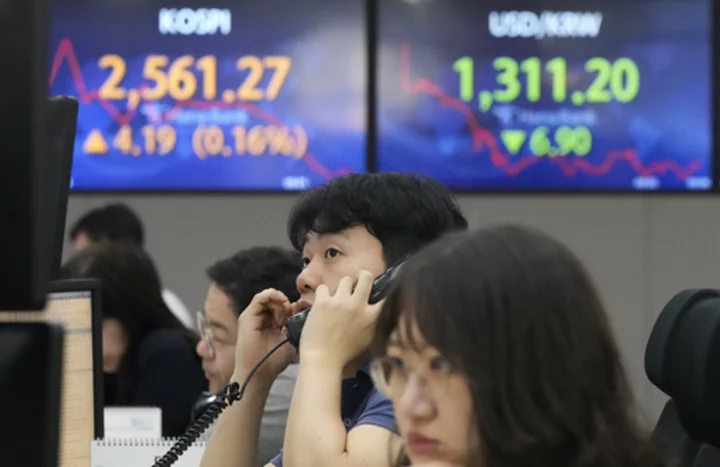BEIJING (AP) — Global stock markets and Wall Street futures fell Tuesday after more talks in Washington on government debt ended with no deal to avoid a potentially jarring default.
London and Frankfurt opened lower. Shanghai, Tokyo and Hong Kong sank. Oil prices retreated.
Wall Street's benchmark S&P 500 index edged up less than 0.1% on Monday as Congress and the White House negotiated over Republican demands to cut social programs in exchange for agreeing to raise the amount the government can borrow.
“The resumption of debt ceiling negotiations spurred some hopes despite distinct risks of brinksmanship and blame-shifting,” Tan Boon Heng of Mizuho Bank said in a report.
In early trading, the FTSE 100 in London was off less than 0.1% at 7,764.59. The CAC 40 in Paris fell 0.6% to 7,435.70 and Frankfurt's DAX lost less than 0.1% to 16,209.77.
On Wall Street, the S&P 500 future was off less than 0.1%. That for the Dow Jones Industrial Average was down 0.1%.
On Monday, the Dow fell 0.4% while the Nasdaq composite rose 0.5%.
In Asia, the Shanghai Composite Index lost 1.5% to 3,246.23 and the Nikkei 225 in Tokyo shed 0.4% to 30,957.77. The Hang Seng in Hong Kong retreated 1.3% to 19,428.08.
The Kospi in Seoul advanced 0.4% to 2,567.55 and Sydney's S&P-ASX 200 was less than 0.1% lower at 7x259.90.
India's Sensex gained 0.3% to 62,153.31. New Zealand and Bangkok declined while Singapore and Jakarta advanced.
Worries about a potential U.S. debt default have added to investor unease about the health of the global economy following interest rate hikes to cool inflation and high-profile bank failures in the United States and Switzerland.
The U.S. government is forecast to run out of money to pay its bills as soon as June 1 if Congress doesn't increase the amount the Treasury is allowed to borrow. That would send shockwaves through global financial markets and could weigh on an already weakening global economy.
President Joe Biden and House Speaker Kevin McCarthy said they had a productive discussion Monday at the White House but reached no agreement.
Republicans are determined to cut spending while Biden’s team offered to hold spending levels flat. Biden wants to increase some taxes on the wealthiest Americans and some big companies. McCarthy said early on that is out of the question.
Stocks rallied last week on hopes for a deal but fell back Friday when negotiations hit a roadblock.
Investors hope the Federal Reserve will hold its key lending rate steady at its next meeting in June after a run of increases to cool business activity and inflation. That would be the first time for the Fed to meet without a rate hike in more than a year.
Micron Technology, the biggest U.S. maker of memory chips, dropped 2.8% after the Chinese government on Sunday banned use of its products in sensitive computer systems, stepping up a feud with Washington over technology and security. Beijing said Micron products had unspecified “network security risks” that could affect national security.
Meta Platforms rose 1.1% after shaking off news that European regulators hit it with a record $1.3 billion privacy fine. Meta said it would appeal.
S&P 500 companies are in the midst of reporting a second straight quarter of profit drops from year-ago levels. The question is how much worse they will get because the economy is slowing under the weight of much higher interest rates meant to get inflation under control.
In the bond market, the 10-year Treasury yield rose to 3.71% from 3.68% late Friday. It helps set rates for mortgages and other important loans. The two-year yield, which moves more on expectations for the Fed, rose to 4.32% from 4.28%.
In energy markets, benchmark U.S. crude lost 15 cents to $71.90 per barrel in electronic trading on the New York Mercantile Exchange. The contract rose 44 cents on Monday to $71.99. Brent crude, the price basis for international oil trading, declined 14 cents to 75.85 per barrel in London. It added 41 cents the previous session to $75.99.
The dollar declined to 138.34 yen from Monday's 138.56 yen. The euro retreated to $1.070 from $1.0819.









